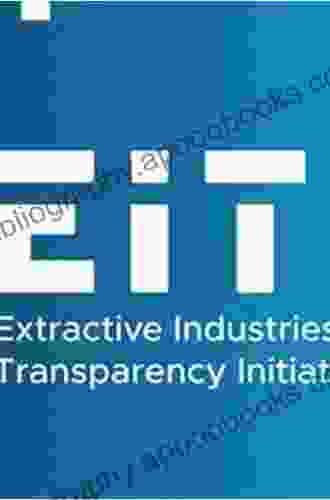Study On The Implementation Of The Extractive Industries Transparency

4.6 out of 5
| Language | : | English |
| File size | : | 4122 KB |
| Text-to-Speech | : | Enabled |
| Screen Reader | : | Supported |
| Enhanced typesetting | : | Enabled |
| Word Wise | : | Enabled |
| Print length | : | 225 pages |
The extractive industries, encompassing the exploration, extraction, and production of natural resources such as oil, gas, and minerals, play a pivotal role in the global economy and development. However, these industries have often been marred by concerns of corruption, lack of transparency, and environmental degradation, raising questions about the sustainability and equitability of their operations.
In response to these concerns, the Extractive Industries Transparency Initiative (EITI) was launched in 2003 as a global standard to promote transparency and accountability in the extractive sectors of resource-rich countries. The EITI framework requires participating nations to disclose information on the financial flows between extractive companies and governments, paving the way for greater scrutiny and public oversight.
This in-depth study explores the implementation of the EITI standard in various countries, providing a nuanced analysis of its successes, challenges, and potential for fostering accountability and sustainable resource management. By shedding light on the complexities of EITI implementation, this report aims to contribute to informed decision-making and policy formulation to ensure that the extractive industries contribute positively to economic development and social progress.
Methodology
This study adopted a mixed-methods approach, combining quantitative and qualitative research methods to gain a comprehensive understanding of EITI implementation. Data was collected through:
- Document Analysis: Review of official EITI reports, government documents, and other relevant literature.
- Case Studies: Detailed case studies of EITI implementation in selected countries, representing diverse geographic, economic, and political contexts.
- Interviews: In-depth interviews with key stakeholders, including government officials, industry representatives, civil society organizations, and academics.
- Statistical Analysis: Quantitative analysis of EITI data to identify trends and patterns in the implementation and effectiveness of the standard.
The triangulation of these methods ensured a rigorous and comprehensive analysis, providing a rich and nuanced understanding of the study's objectives.
Findings
Successes
The study identified several key successes in the implementation of the EITI standard:
- Increased Transparency: EITI has led to significant improvements in the disclosure of information on revenues, payments, and contracts in the extractive industries, enhancing public access to data.
- Enhanced Accountability: The transparent reporting of financial flows has strengthened accountability mechanisms, enabling parliaments, civil society, and citizens to hold governments and extractive companies to account.
- Improved Governance: EITI has contributed to better governance practices in the extractive sectors, reducing opportunities for corruption and promoting fair and equitable resource management.
- Public Engagement: EITI has facilitated increased public engagement in the extractive industries, fostering dialogue between stakeholders and contributing to informed decision-making.
Challenges
Despite its successes, the study also identified several challenges associated with EITI implementation:
- Data Quality and Consistency: Ensuring the accuracy, reliability, and comparability of reported data remains a challenge, particularly in countries with weak administrative capacities.
- Scope and Coverage: The EITI standard does not cover all aspects of the extractive industries, such as social and environmental impacts, leaving room for potential gaps in transparency.
- Stakeholder Involvement: In some cases, effective stakeholder involvement, particularly from civil society organizations and local communities, has been limited, hindering the full potential of EITI to promote inclusivity and accountability.
- Political Will and Commitment: The implementation of EITI requires strong political will and commitment from governments, which may vary across countries and over time.
Potential for Fostering Accountability and Sustainable Resource Management
The study concludes that EITI has the potential to play a significant role in fostering accountability and promoting sustainable resource management in the extractive industries, provided that key challenges are addressed.
By strengthening transparency and accountability mechanisms, EITI can contribute to:
- Reducing Corruption: Increased scrutiny of financial flows can deter corruption and promote ethical practices throughout the extractive value chain.
- Improving Resource Governance: Transparent reporting of revenues and payments enables governments to make informed decisions on resource allocation and management, leading to more sustainable practices.
- Promoting Social Equity: By ensuring that citizens have access to information on how their natural resources are being managed, EITI can empower communities to advocate for fair and equitable benefit-sharing.
- Enhancing Environmental Sustainability: Improved transparency and stakeholder engagement can facilitate dialogue on environmental risks and promote responsible resource extraction practices.
Recommendations
Based on the findings of this study, the following recommendations are proposed to enhance the effectiveness of EITI implementation and maximize its potential for fostering accountability and sustainable resource management:
- Strengthen Data Quality and Consistency: Invest in capacity building and technical assistance to improve the quality and consistency of reported data, ensuring reliable and comparable information.
- Expand EITI's Scope and Coverage: Extend EITI reporting beyond financial flows to include social and environmental impacts, providing a more comprehensive view of the extractive industries.
- Promote Inclusive Stakeholder Engagement: Engage a diverse range of stakeholders, including civil society organizations, local communities, and indigenous groups, in all phases of EITI implementation to ensure inclusivity and accountability.
- Foster Political Will and Commitment: Advocate for strong political will and sustained commitment from governments to ensure the long-term success of EITI implementation.
The implementation of the Extractive Industries Transparency Initiative (EITI) has marked a significant step towards enhancing transparency and accountability in the extractive industries. While the study has identified both successes and challenges in EITI implementation, it unequivocally affirms the standard's potential to foster accountability, promote sustainable resource management, and contribute to inclusive and equitable economic development in resource-rich countries.
By addressing the identified challenges and implementing the proposed recommendations, EITI can continue to play a pivotal role in ensuring that the extractive industries contribute positively to the economic, social, and environmental well-being of present and future generations.
4.6 out of 5
| Language | : | English |
| File size | : | 4122 KB |
| Text-to-Speech | : | Enabled |
| Screen Reader | : | Supported |
| Enhanced typesetting | : | Enabled |
| Word Wise | : | Enabled |
| Print length | : | 225 pages |
Do you want to contribute by writing guest posts on this blog?
Please contact us and send us a resume of previous articles that you have written.
 Book
Book Novel
Novel Page
Page Chapter
Chapter Text
Text Story
Story Genre
Genre Reader
Reader Library
Library Paperback
Paperback E-book
E-book Magazine
Magazine Newspaper
Newspaper Paragraph
Paragraph Sentence
Sentence Bookmark
Bookmark Shelf
Shelf Glossary
Glossary Bibliography
Bibliography Foreword
Foreword Preface
Preface Synopsis
Synopsis Annotation
Annotation Footnote
Footnote Manuscript
Manuscript Scroll
Scroll Codex
Codex Tome
Tome Bestseller
Bestseller Classics
Classics Library card
Library card Narrative
Narrative Biography
Biography Autobiography
Autobiography Memoir
Memoir Reference
Reference Encyclopedia
Encyclopedia Erika Grey
Erika Grey Sean Macblain
Sean Macblain Ralph Peters
Ralph Peters Matthew Stavros
Matthew Stavros Vickie Dinsmore
Vickie Dinsmore David Rowell
David Rowell Wayne Clingman
Wayne Clingman Freek Berson
Freek Berson Steven Wolff
Steven Wolff Nicholas Baragwanath
Nicholas Baragwanath Deborah Short
Deborah Short Jon Mooallem
Jon Mooallem Tiana Laveen
Tiana Laveen Sanjena Sathian
Sanjena Sathian Harutomo Hasegawa
Harutomo Hasegawa Dean Young
Dean Young Zoe Beth Geller
Zoe Beth Geller N Dorris
N Dorris David Reiss
David Reiss Deborah Alexander
Deborah Alexander
Light bulbAdvertise smarter! Our strategic ad space ensures maximum exposure. Reserve your spot today!

 Darius CoxTwirling Naked In The Streets And No One Noticed: Growing Up With Undiagnosed...
Darius CoxTwirling Naked In The Streets And No One Noticed: Growing Up With Undiagnosed... Alex FosterFollow ·15.8k
Alex FosterFollow ·15.8k Douglas AdamsFollow ·7.5k
Douglas AdamsFollow ·7.5k Corbin PowellFollow ·6.4k
Corbin PowellFollow ·6.4k Virginia WoolfFollow ·6.1k
Virginia WoolfFollow ·6.1k Morris CarterFollow ·18.3k
Morris CarterFollow ·18.3k Mark TwainFollow ·11.3k
Mark TwainFollow ·11.3k Ben HayesFollow ·3k
Ben HayesFollow ·3k Rudyard KiplingFollow ·16.6k
Rudyard KiplingFollow ·16.6k

 Finn Cox
Finn CoxEmpowering School-Based Professionals: A Comprehensive...
: The Role of School-Based Professionals in...

 F. Scott Fitzgerald
F. Scott FitzgeraldThe Santa Fe Trail Twentieth Century Excursion: A...
Get ready to embark on an...

 Kendall Ward
Kendall WardThe Ultimate Trivia Guide to Bruce Springsteen and the...
Bruce Springsteen...

 Jedidiah Hayes
Jedidiah HayesThe Trouble with Lacy Brown: Texas Matchmakers - A...
Prepare to be swept...
4.6 out of 5
| Language | : | English |
| File size | : | 4122 KB |
| Text-to-Speech | : | Enabled |
| Screen Reader | : | Supported |
| Enhanced typesetting | : | Enabled |
| Word Wise | : | Enabled |
| Print length | : | 225 pages |













